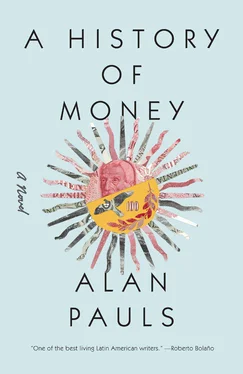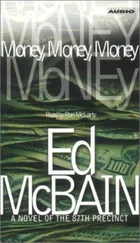For the time being, he doesn’t argue. He’s too intrigued by his mother’s interest in his romantic situation. By this eagerness, which is made up of suspicion and rivalry at once … By this strange anticipation … The last time he remembers experiencing anything similar, he’s sixteen years old and has just started going out with an extraordinarily earnest girlfriend, a militant member of a leftist youth group who never reads books of fewer than six hundred pages, has a perfect instinct for gifts (a pair of flippers, a telescope, a fountain pen that will last him twenty-two years), and visits him with businesslike regularity every time he gets sick. The moment his mother leaves them alone, she shoots a disapproving look at his box of antibiotics and, with one of her two-lipped magic tricks — kissing, indoctrinating: which comes first? — tries to convert him to the dogma of homeopathy. “I know you’re not going to like what I’m about to say, but I’m going to say it anyway,” his mother tells him that night, moments after his wonder girlfriend leaves, not before gathering a heap of snotty tissues with surprising fortitude and throwing them in the trash. “Don’t even think about marrying that girl. Listen to me: live a little first, then get married.” After that, there’s nothing, not a single word either for or against, never anything more on the subject, and with good reason: she must become immune to such worries when he doesn’t pay any attention, either then, in the case of the precocious Bolshevik Florence Nightingale, with whom he ends up moving in and spending nearly ten years afloat in a voluptuous, feverish world, or the next time, with the musical therapist, or ever. And when he succumbs to his last love, the one that falls apart over the same eleven months it takes to finish the house that’s supposed to shelter it, she’s so preoccupied, so absorbed by the crazed progress of the Beast, that she doesn’t even remember to give him the reed blinds she promised him for the gallery. And yet the widow obviously interests her. She’s very careful not to show it, as though asking about her directly would be a sign of weakness or an admission of defeat. But her attention to the changes that spring up in him betrays her. Nothing escapes her. She notices when he wears a shirt in an unexpected color, or slips in a new word that’s still a little rigid and crisp in the sentence, like new sheets, or absorbs and neutralizes her anxiety attacks effortlessly and with a show of good humor, though they used to infuriate him, and every time all of her alarm bells go off at once, mobilizing her legion of molecular spies around the only foreign body liable to have inspired these developments. Sometimes she interprets the delinquent’s behavior as a sign. Maybe it entertains her to see her son dealing with a misfit of the type he never was at that age; whatever the reason, whenever he relays the stories of his crimes to her — in minute detail, as though trying to underscore the difference between the nightmare he’s suffering as an innocent, utterly unsuspecting substitute father and the heavenly, low-key child she once had — she so rejoices in hearing them that the perfectly irrelevant advice she insists on repaying him with afterward, while she’s still trembling with laughter, sounds to him like disguised arguments for the defense. In any case, while she pieces together the widow’s personality from the bottle-green shirt he shows up in, the new haircut that suddenly makes him seem like a child, and the chivalrous impulses he lavishes upon her, she also builds a mental picture of it based on the boy’s misdeeds — without, of course, ever revealing to him the identikit she’s assembled, a freakish cameo that’s part manipulative harpy, part passive-aggressive monster, in line with the jargon of the psychological parish of which she’s been a devotee for decades, with the most counterproductive results.
All this changes nothing for him. Since that first time, when he ignored her objection to his Bolshevik girlfriend, his love life has unfolded far away from his mother, on another plane; it’s not shielded — since it’s not protected by anything too visible — so much as stubborn and invulnerable, protected by its own rules and protocols, like the tax havens that are becoming fashionable at around the same time, which are generally to be found on more or less remote islands, hermetic protectorates, tiny countries that are weak at first glance but have the unique strength of discretion, the ability to hoard secrets that the rest of the world goes out of its way to find out. He’s brought the whole system to such a state of perfection that nowadays he doesn’t even have to worry about safeguarding any information. He’s not afraid. He could tell her anything — and in fact he does, not only when he admits that his bottle-green shirt, old-fashioned manners, and short hair are the direct result of Sonia’s wishes, but also explicitly, when he describes her appearance (and has some difficulty explaining the concept of a Prince Valiant haircut, owing to his mother’s gross ignorance in the matter of comics) or her moral character (she gives money to everyone who asks her on the street, every time, without exception or justification, and she removes anyone who has a live-in maid from her social circle), or when he divulges her habits (an hour of yoga between morning sex and breakfast, limited TV, windows wide open in the middle of winter) — and the secret would still be right there, intact, inaccessible to his mother, like openly transmitted frequencies that are audible only to highly trained ears. One day while he’s waiting for her at the only serviceable table in the patisserie she’s arranged to meet him in — one of the unpredictable spots to which his mother is faithful to the point of fanaticism, simply because they offer her something she can’t resist, just one thing, something unusual but not necessarily indispensable, like two-ply toilet paper in the ladies’ restroom, for example, or white, pure-cotton tablecloths, or Renaissance music, or the sickly sweet whiskey liqueur on which she gets hooked on the ferry that takes her to the Beast — he starts to look through some photos he’s just had developed, souvenirs from a “getaway”—one of the widow-isms most likely to raise his mother’s hackles — to Misiones, which starts badly, on a precarious dinghy at Iguazú Falls that the delinquent, who’s been averse to lifejackets since childhood, threatens to slash with the Victorinox he convinced his mother to buy him from the shop in the hotel’s lobby, and ends worse, in a cell at the police station on the Triple Frontier, where he spends six hours in an animated trilingual conclave (Brazilian prostitute, Argentine dealer, Paraguayan smuggler), having been accused of screening a pornochanchada on twenty-five color TVs at an electrical appliance store in Foz de Iguazú. He’s wondering for the nth time why what he sees in the viewfinder when he takes a photo is never the same color as the nine-by-thirteen prints that are supposed to capture it, why, for God’s sake, he can now see things he thought he’d left out of the frame (the back of a yellow Renault 12; the hand — index finger extended, wrist covered in fake gold watches — of the tourist from Minas Gerais who hounded them with his affability and his bad breath), but not, though he searches desperately and even considers going back to the photo lab to complain, things he was sure he’d caught (the smiling, sleeping widow’s slightly aquiline profile on her pillow), when his mother arrives and stands by his side, looking down at the photos as he goes through them, and after savoring a few flashes of banal intimacy — the widow wearing her bathing suit, a poolside massage, eating breakfast on the balcony in a robe, dazzled outside the toucan enclosure at the bird sanctuary, smiling on her pillow, sleeping with her mouth half open — she sits down, takes off her sunglasses with a trembling hand, and says: “How can you take such ugly pictures? Isn’t it time you got yourself a decent camera?” No, he’s not afraid to tell and show her everything, because he knows that entrusting the secret to his mother, offering it up like this, freely, to her foolishness, is the best way to keep it.
Читать дальше












